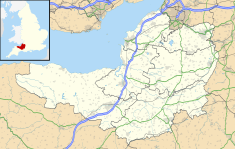Dolebury Warren
| Dolebury Warren | |
|---|---|
| Native name Dolebury Camp | |
 |
|
| Location | Churchill, Somerset |
| Coordinates | 51°19′39″N 2°47′01″W / 51.32750°N 2.78361°WCoordinates: 51°19′39″N 2°47′01″W / 51.32750°N 2.78361°W |
| Governing body | Avon Wildlife Trust |
| Owner | National Trust |
| Official name: Dolebury Camp | |
| Designated | 19 December 1929 |
| Reference no. | 1008184 |
| Site of Special Scientific Interest | |
 |
|
| Area of Search | Avon |
|---|---|
| Interest | Biological |
| Area | 90.6 hectares (0.906 km2; 0.350 sq mi) |
| Notification | 1952 |
| Natural England website | |
Dolebury Warren (also known as Dolebury Camp) is a 90.6 hectares (224 acres) biological Site of Special Scientific Interest (SSSI) and ancient monument near the villages of Churchill and Rowberrow in North Somerset, part of South West England. It is owned by the National Trust, who acquired the freehold in 1983, and managed by the Avon Wildlife Trust.
Standing on a limestone ridge on the northern edge of the Mendip Hills, it was made into a hill fort during the Iron Age and was occupied into the Roman period. The extensive fort covers 9.1 hectares (22 acres) with single or double defensive ramparts around it. The name Dolebury Warren comes from its use during the medieval or post medieval periods as a rabbit warren. The topography and differing soil types provide a habitat for an unusually wide range of plants, attracting a variety of insects, including several species of butterfly.
The site is at the top of a Carboniferous Limestone ridge on the northern edge of the Mendip Hills. It forms part of the Black Down Pericline where the limestone has been exposed because of erosion of the overlying Triassic Dolomitic Conglomerate. The soil depth varies considerably, owing to the slope within the site and the effects of its exposure to the wind.
...
Wikipedia

